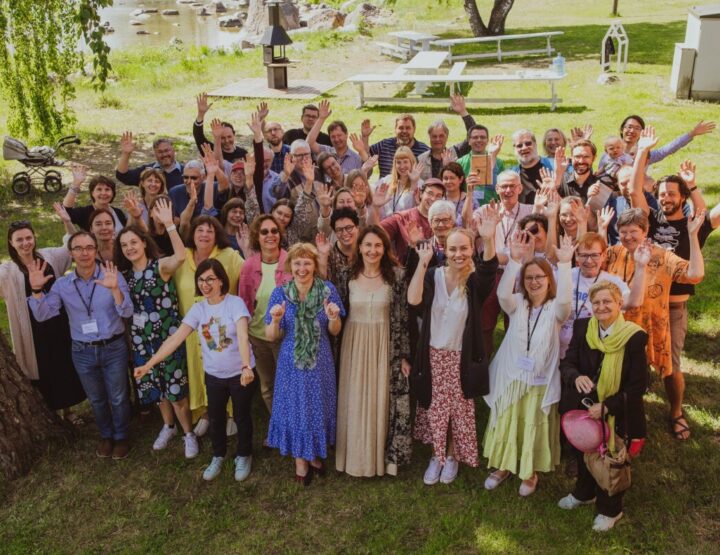It came as an extremely pleasant surprise early in the New Year to receive an invitation from the Estonian Literature Information Centre (ELIC) to attend the Estonian Translators’ Seminar in Käsmu and I was delighted to accept. I started learning Estonian two years ago and this would be my first visit to the country.
Thus one sunny May afternoon I was at the appointed meeting place in Tallinn to await the coach to Käsmu and meet my fellow translators for the first time. There were about 30 of us in total, one from the US and the rest from all over Europe: Norway, Finland, Russia, Hungary, Ukraine, Poland, Latvia, Lithuania, the Netherlands, Germany, France, Ireland and, of course, the UK. We had all converged on Estonia to hear a series of talks by Estonian writers and experts on Estonian literature, swap notes and meet some of the authors we had translated.
The arrangements and structure of the seminar were in the capable hands of ELIC’s Ilvi Liive and her assistant Harri Morritz, who ensured that things ran in a professional and friendly manner, and were on hand to provide assistance and advice. They showed us to our accommodation in Käsmu and, after freshening up we were able to do some exploring before visiting the local Maritime Museum where the curator gave a very witty talk about himself and the artefacts in his care. The evening ended with a glass of wine and a chance to unwind and meet everyone else properly.
Käsmu is an idyllically beautiful village on the North Estonian coast which is home not only to a Maritime Museum but, more importantly for our purposes, the Estonian Writers’ Union Retreat. The care and attention of the perenaine, and particularly the delicious local fare prepared by her and her staff at one of the village B&Bs, ensured we were all in the best possible mood to listen to the variety of speakers lined up to address us. The opening day featured Märt Väljataga and Jan Kaus, who gave talks on literary criticism and essays in the new millennium, and on poetry respectively. Jan Kaus also introduced most of the speakers and chaired most of the ensuing discussions over the three days. Urmas Vadi and Olavi Ruitlane gave readings of their own work, and were very well received.
The following day Piret Kruuspere spoke about drama and Janika Kronberg gave a comparative analysis of prose, and the final day saw Eeva Park, Lauri Pilter and Rein Raud discussing their own work. Each session was followed by the opportunity for the translators to put their own questions both as part of a group discussion and individually afterwards. Indeed, perhaps one of the most pleasant features of the seminar was that the authors and other speakers were in attendance far beyond their allotted slots and were more than willing to chat about their work informally in the breaks. Other writers also came along, including Jaan Kaplinski, Arvo Valton and Doris Kareva to name but a few, and were happy to talk about their work as well.
The schedule also found space for a visit to Viinistu, the site of Jaan Manitski’s rightly acclaimed restaurant and art gallery. After being wined and dined the man himself led a tour of the restaurant, conference centre and art gallery, and talked about the work under way to convert one of the buildings into a concert hall. Reputedly the richest man in Estonia, Mr Manitski proved himself to be down-to-earth and very enthusiastic about his project, which he himself matter-of-factly described as being located at ‘the end of the world’. It was most refreshing to see someone investing so much thought, time and energy, not to mention money, in his roots.
On a different scale, walks along the beach and through the forest also proved very rewarding. It is easy to see why Käsmu is the home of the Retreat: it is so peaceful and beautiful. Trees grow almost to the water’s edge and the area is rich in birdlife. Nightingales were even heard singing!
The seminar proved to be a chance for the translators to meet not only authors but also other translators and to explore the local scenery while discussing translation problems. During a sun-kissed walk to the local lake Antoine Chalvin, who translates into French, gave a very interesting account of some of the lexical gymnastics he had to perform when working on his prize-winning translation of Kalevipoeg and went into some of the intricacies of translating Jaan Kross. We also talked among ourselves about how to increase interest in Estonian literature so that it can reach the wider audience it so obviously deserves.
On a lighter note, we also made brave and largely hilarious but failed attempts to recite tongue-twisters in each other’s languages, and I discovered that the most enjoyable way of watching the Eurovision semi-final is definitely to be in the company of people representing several of the nations in the competition. There was cringing, fun-poking, mickey-taking and, yes, cheering aplenty, and it was a great way to break down any (remaining) formal barriers and make friends.
The seminar itself closed with Kristiina Ehin giving a reading outside the Maritime Museum to celebrate the launch of her new anthology Kaitseala. The beautiful setting, with Kristiina’s words floating on the still evening air overlooking the sea was a fitting end to three very rewarding days.
The article was first published in ‘Lennuk’, magazine of the British-Estonian Association (BEST)
Käsmu
By Susan Wilson
–
Share:


